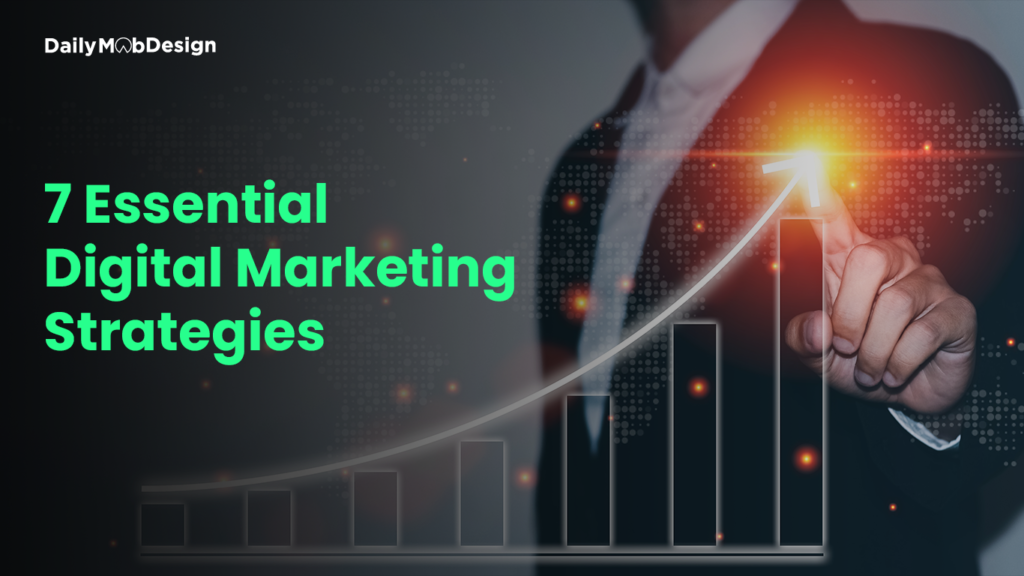
In today’s digital-first world, businesses need more than just an online presence—they need a data-driven digital marketing strategy that fuels growth. Whether you’re a startup or an established brand, leveraging the right marketing tactics can significantly enhance brand visibility, customer engagement, and revenue. This guide explores seven essential digital marketing strategies to take your business to the next level.
Looking for expert digital marketing services? Contact Us to get started!
1. Search Engine Optimization (SEO)
SEO is the backbone of online visibility. Optimizing your website for search engines ensures higher rankings, increased organic traffic, and better brand credibility.
Key SEO Tactics:
- On-Page SEO: Optimize meta titles, descriptions, headings, and content with relevant keywords.
- Technical SEO: Improve website speed, mobile-friendliness, and structured data.
- Link Building: Acquire high-quality backlinks to boost domain authority.
- Content Marketing: Publish valuable blogs, infographics, and videos to enhance user engagement.
SEO is a long-term strategy that builds organic traffic and improves search rankings. Investing in professional SEO services can significantly enhance your online presence.
2. Content Marketing
Content is king, and delivering valuable, high-quality content builds trust, authority, and conversions. A strong content marketing strategy includes:
- Blog Writing: SEO-driven blogs that answer customer queries and drive traffic.
- Video Marketing: Engaging video content for YouTube, social media, and ads.
- Infographics & E-books: Visual and long-form content that educates and nurtures leads.
- Case Studies & Testimonials: Showcase real-world success stories to build credibility.
A successful content marketing strategy establishes your brand as an industry leader, driving long-term engagement and customer loyalty.
Pro Tip: Optimize your blog posts with long-tail keywords for better SERP rankings.
3. Pay-Per-Click (PPC) Advertising
PPC campaigns offer immediate visibility by placing your ads at the top of search results. Platforms like Google Ads and social media advertising drive targeted traffic to your site.
Why Use PPC?
- Immediate results compared to organic SEO.
- High-intent audience targeting based on keywords, demographics, and interests.
- Measurable performance and ROI tracking.
A well-optimized PPC campaign ensures that your advertising budget generates maximum ROI by reaching the right audience at the right time.
Example: A well-optimized PPC campaign can increase conversions by 200% in just a few months!
4. Social Media Marketing (SMM)
With billions of users, social media platforms like Facebook, Instagram, LinkedIn, and TikTok are powerful tools for brand awareness and engagement.
Effective Social Media Strategies:
- Regular posting with engaging visuals & videos.
- Running paid social ads for better reach and conversions.
- Influencer collaborations to expand audience reach.
- Community engagement—respond to comments, DMs, and feedback.
A well-planned social media marketing strategy enhances customer engagement and boosts brand awareness.
5. Email Marketing
Email remains one of the highest ROI marketing channels. A personalized email strategy nurtures leads, retains customers, and boosts conversions.
Email Marketing Best Practices:
- Segment your audience for better targeting.
- Create engaging subject lines to improve open rates.
- Automate email sequences for lead nurturing.
- Use compelling CTAs to drive conversions.
Stat: Email marketing delivers an average ROI of 4200% ($42 for every $1 spent).
6. Conversion Rate Optimization (CRO)
Driving traffic is important, but converting visitors into customers is the ultimate goal. CRO strategies ensure that users take the desired action on your website.
CRO Techniques:
- A/B testing headlines, CTA buttons, and layouts.
- Optimizing landing pages for speed and responsiveness.
- Reducing form fields to improve lead generation.
- Using social proof (reviews & testimonials) to build trust.
Investing in CRO services can significantly improve your website’s ability to turn visitors into loyal customers.
Example: A simple CTA button color change increased conversions by 30% for an e-commerce brand.
7. Influencer & Affiliate Marketing
Leveraging influencers and affiliate marketers helps expand your brand’s reach by tapping into their existing audiences.
Benefits of Influencer Marketing:
- Builds trust and credibility through authentic recommendations.
- Generates high-quality leads with niche audience targeting.
- Increases engagement and brand awareness on social platforms.
Pro Tip: Choose influencers whose audience aligns with your target market to maximize ROI.
Final Thoughts: Choose the Right Strategies for Your Business
Every business is unique, and the best digital marketing strategy depends on your goals, industry, and target audience. Whether it’s SEO, social media, content marketing, or PPC, a well-structured digital strategy will drive sustainable business growth.
Need expert digital marketing services? Contact Us to elevate your brand’s online presence!
Frequently Asked Questions (FAQs)
Q. Which digital marketing strategy is most effective?
Ans. Each business has different needs, but SEO, content marketing, and PPC are among the most effective strategies for long-term success.
Q. How long does it take to see results from digital marketing?
Ans. SEO and content marketing take 3-6 months, while PPC ads deliver instant traffic and conversions.
Q. Can small businesses benefit from digital marketing?
Ans. Absolutely! Small businesses can leverage social media, local SEO, and email marketing to grow their online presence cost-effectively.